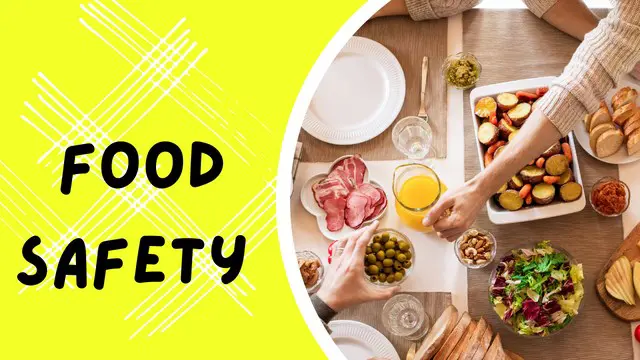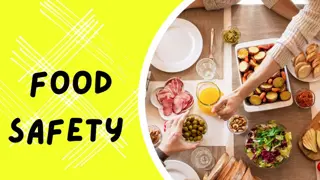
Food Safety and Hygiene Level 2
CPD Certified| Free PDF Certificate | Lifetime Access | Learner Support | No Hidden Fees | 100% Success Rate
EDURISE
Summary
- Certificate of completion - Free
- Reed courses certificate of completion - Free
- Tutor is available to students
Add to basket or enquire
Overview
Elevate Your Food Safety Expertise with the Food Safety Masterclass
In the dynamic world of food safety, ensuring the health and well-being of consumers is paramount. From farm to fork, meticulous knowledge of food safety protocols is crucial to safeguard public health and boost consumer confidence.
Job Demand:
- Food safety experts are in high demand across the food production and service industry, as regulations become more stringent and consumer awareness grows.
Business Impact:
- For food businesses, compliance with food safety standards is not only a legal requirement but a critical aspect of reputation management and success.
Career Prospects:
- A career in food safety offers diverse prospects, from food safety inspectors and auditors to consultants and quality assurance professionals.
Why You Should Consider This Role:
Consumer Well-being: You play a vital role in safeguarding public health by ensuring that the food people consume is safe and free from contaminants.
Regulatory Compliance: Food safety experts are at the forefront of regulatory compliance, ensuring businesses meet food safety standards and avoid legal complications.
Quality Assurance: By mastering food safety, you become a linchpin in maintaining the quality and integrity of food products.
Problem Solver: You'll be a critical thinker, identifying potential risks and implementing measures to mitigate them.
Continuous Learning: The field is ever-evolving, with changing regulations, emerging pathogens, and new technologies, making it a dynamic and intellectually stimulating career.
Industry Impact: Your expertise will have a direct impact on the success and reputation of food businesses, which can be immensely satisfying.
Consumer Confidence: Your work directly influences consumer trust, which can be a powerful driver of business growth.
The Food Safety Masterclass is your gateway to becoming a food safety expert. Whether you're in the food production industry, food service, or food retail, this course will equip you with the knowledge and skills to navigate the complex world of food safety.
Free Gift
- Course Completion PDF Certificate
- Tutor Support
Curriculum
Course media
Description
Learning Outcomes:
Comprehensive Understanding of Food Safety:
- Develop a comprehensive understanding of food safety principles, covering its significance, global challenges, and hazards that can compromise food safety.
Risk Identification and Mitigation:
- Gain the ability to recognize food safety hazards and learn strategies to design safety into food products and processes, reducing the risk of contamination.
Effective Food Safety Management:
- Acquire skills to implement, maintain, and enhance a food safety program, ensuring the ongoing safety of food products and processes.
Food Safety in Diverse Settings:
- Learn to apply food safety knowledge in various contexts, including global supply chains, foodservice operations, and product development.
Personal Hygiene and Health Compliance:
- Understand the importance of personal hygiene in food safety and the role of individuals in upholding food safety standards in their work environment.
Module Descriptions:
Food Safety — An Introduction:
- Module 1 provides an introduction to the fundamentals of food safety, its significance, and the key principles that underpin safe food handling and production.
Food Safety Challenges in the Global Supply Chain:
- In Module 2, you'll explore the challenges of maintaining food safety in the global supply chain, addressing issues related to transportation, storage, and international standards.
Recognizing Food Safety Hazards:
- Module 3 focuses on recognizing food safety hazards, whether chemical, biological, or physical, and understanding their potential impact on food products.
Designing Safety into a Food Product:
- Module 4 delves into the principles of designing safe food products, considering ingredients, processing methods, and packaging to minimize risks.
Designing a Safe Food Process:
- In Module 5, you'll learn how to design food processes that prioritize safety, including equipment, sanitation practices, and monitoring procedures.
Maintaining and Improving a Food Safety Programme:
- Module 6 addresses the ongoing maintenance and improvement of food safety programs, emphasizing the importance of continuous monitoring and adaptation.
Food Safety in Foodservice Operations:
- This module explores food safety considerations specific to foodservice operations, where food is prepared and served to consumers.
Personal Hygiene:
- Module 8 focuses on the critical role of personal hygiene in food safety, emphasizing the responsibility of individuals in upholding hygiene standards.
This course equips learners with essential knowledge and skills in food safety, from hazard recognition to the design of safe food products and processes, ultimately promoting the well-being of consumers and the integrity of the food industry.
Certificate of Completion
After completing the Food Safety diploma course, you will be able to obtain your free PDF certificate of course completion.
Who is this course for?
Ideal Audience for this Course:
Food Industry Professionals:
- Individuals working in various roles within the food industry, including production, supply chain management, quality assurance, and foodservice.
Quality Control and Assurance Personnel:
- Quality control and assurance professionals looking to enhance their knowledge and expertise in food safety to improve product quality and safety.
Global Supply Chain Managers:
- Supply chain managers operating in the global food industry, aiming to address food safety challenges specific to international distribution and transportation.
Product Development Specialists:
- Product development specialists and food technologists interested in designing safe food products and processes while meeting consumer demands.
Food Process Engineers:
- Food process engineers seeking to optimize food processing methods to ensure the safety and quality of food products.
Food Safety Managers:
- Food safety managers responsible for implementing, maintaining, and enhancing food safety programs in food manufacturing and service operations.
Foodservice Professionals:
- Individuals working in foodservice establishments, including restaurants, catering services, and cafeterias, looking to uphold food safety standards.
Hygiene and Health Compliance Personnel:
- Professionals involved in personal hygiene and health compliance, such as healthcare workers or food handlers, aiming to understand their role in food safety.
Regulatory Compliance Officers:
- Regulatory compliance officers and inspectors involved in ensuring that food businesses adhere to safety regulations and standards.
Aspiring Food Safety Enthusiasts:
- Individuals considering a career in food safety, desiring a foundational understanding of the subject and its application in diverse contexts.
This course is suitable for a wide range of professionals and individuals working in or aspiring to enter the food industry. It provides insights into food safety principles and their application in various settings, from global supply chains to foodservice operations.
Requirements
The Food Safety course has no formal entry requirements.
Career path
- Food Safety Officer: Entry-level position with a typical UK salary ranging from £20,000 to £30,000 per year.
- Food Safety Specialist or Compliance Manager: With experience and qualifications, salary can advance to between £31,000 and £60,000 annually.
- Senior Food Safety Consultant or Food Safety Director: Experienced professionals in these roles may earn £61,000 to £100,000 or more.
Questions and answers
Currently there are no Q&As for this course. Be the first to ask a question.
Certificates
Certificate of completion
Digital certificate - Included
Reed courses certificate of completion
Digital certificate - Included
Will be downloadable when all lectures have been completed
Reviews
Currently there are no reviews for this course. Be the first to leave a review.
Legal information
This course is advertised on reed.co.uk by the Course Provider, whose terms and conditions apply. Purchases are made directly from the Course Provider, and as such, content and materials are supplied by the Course Provider directly. Reed is acting as agent and not reseller in relation to this course. Reed's only responsibility is to facilitate your payment for the course. It is your responsibility to review and agree to the Course Provider's terms and conditions and satisfy yourself as to the suitability of the course you intend to purchase. Reed will not have any responsibility for the content of the course and/or associated materials.


